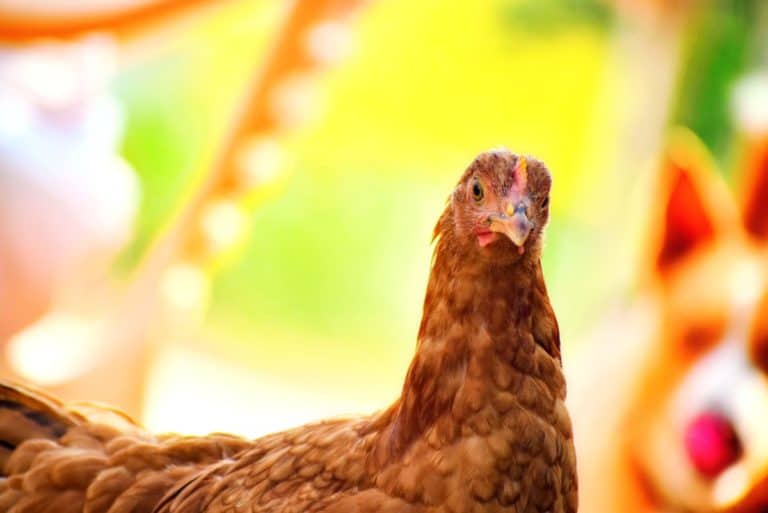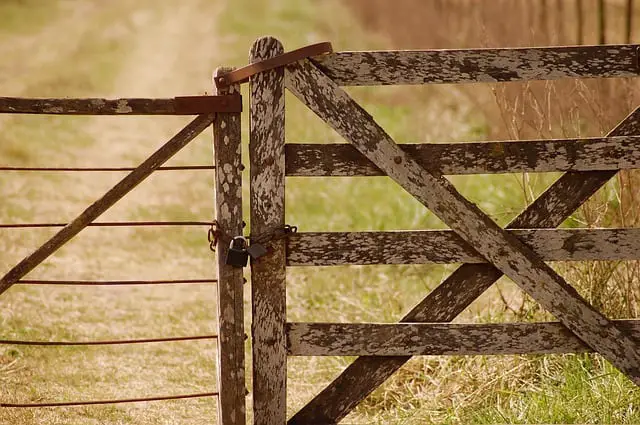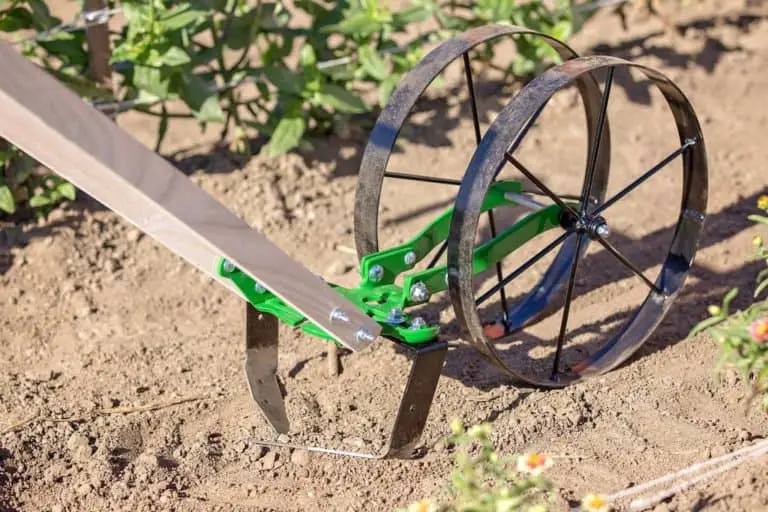
It doesn’t matter if you have 100 acres, or a small backyard, if you have livestock, you’ll have predators. Everything out there thinks you brought your animals home for their supper, and they are going to try to take them.
There are few things sadder or more frustrating on the homestead than discovering your livestock has been the victim of predators. Thankfully, after 40 years of dealing with them, I’ve found proven ways to thwart their efforts and send them down the road to look for their supper elsewhere.
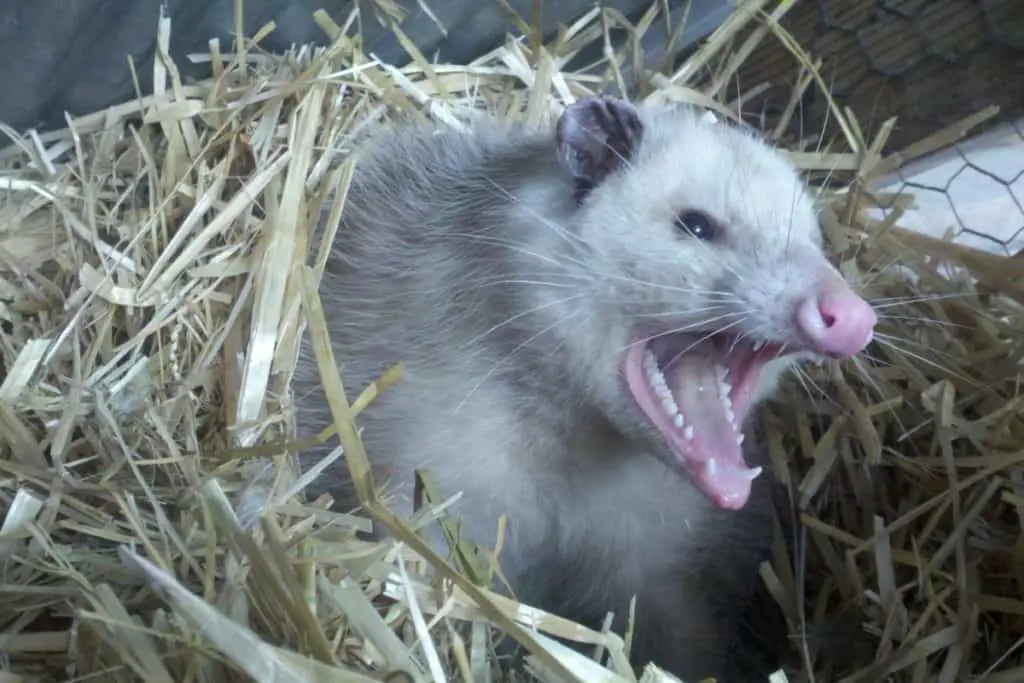
The Predators
Years ago, chickens were only raised in rural areas. Now, a lot of cities have made it legal to raise backyard chickens, and you see them everywhere. But, just because you’re in the city doesn’t mean you are immune to predation. You’ll still have to take precautions, even in the city.
The types of predators that you encounter will vary according to the part of the country you are in. For instance, I’m in East Texas. We don’t have grizzly bears in East Texas, but you would if you were in Alaska.
First, you need to know the predator in your particular location. Then you’ll know how to deal with it.
Small Predators
Obviously, small predatory animals will typically only attack small livestock. In other words, you’re not going to see a raccoon attack a full-grown cow. However, a raccoon will absolutely wreak havoc on small fowl, and small animals. Mainly of chickens, but it could also include quail, ducks, other exotic birds, and maybe even rabbits.
If you raise chickens, then minks, possums, raccoons, and skunks might be your main small predators. My main problem with small predation has been with the opossum.
One year (before I had my predator precautions intact) an opossum (we call them “possums” around here) killed 13 of my full-grown chickens within a few days time. I finally caught him, and let’s just say he hasn’t killed a chicken since. What is so frustrating about it is that he didn’t even eat them. He was just killing for fun, or so it seemed.
So those will be the main culprit for your chicken flock, and the woods are full of them. Even if you raise chickens in the city, these predators are probably going to be a problem for you, And you will have to take steps to thwart them.
Large Predators
Just because they’re large predators does not mean they will only attack large animals. Large predators would absolutely love a chicken dinner if you make one available to them. The idea is to discourage them.
I realize some people have a problem with exterminating a predator, and would rather have a humane solution. What I discuss here will be humane.
So, what are the large predators? Some large predator species include coyotes, wild dogs, wolves, bobcats, cougars, foxes, and bears. That is not an exhaustive list. I’m sure there are more, but the deterrents I’ll discuss should work for all of the large predators.
Many now have a huge problem with feral hogs. And, a feral hog can also be a predator of small livestock. So far, I have not had any hogs on my place, but I know they are all around me. And that’s why I think one of the solutions I’m going to propose, may have deterred any feral hog traffic on my property.

If you raise sheep or goats understand that those baby kids and lambs are almost completely vulnerable to them. I have raised sheep, and I have lost lambs to coyotes. A coyote or a wolf can dig under the best fence you have, to gain access to the babies. And once they have killed one, you can bet your bottom dollar they will come back for more.
Preventing A Ground Attack
So far, these are all ground assaults. Good fencing helps a lot, and I encourage you to build the best and strongest fence you can possibly afford to build. Your chicken pen needs to be built with heavy-duty chicken wire, or even hardware cloth. Hardware cloth is more expensive, but it is strong.
However, as I said before these canines, like coyotes and foxes, are very skilled at digging under fences, and will certainly do so for a quick meal.
Many swear by a Livestock Guard Dog (LGD), a Llama or a Donkey for predator control. These large animals usually will live with the animals they are protecting, and think of them as their own family. They will usually protect them with their lives.
Let me add here that I’ve never had an LGD or a llama, but I did use a donkey with my sheep. Unfortunately, he didn’t work out. The donkey I had actually killed a few of my newborn lambs before I realized what was happening. I had to give him away, but you might have better luck with one. I suggest that you only consider a guard animal that is currently protecting the kinds of animals that you raise.
Several years ago I bought two PredatorGuard (my Amazon affiliate link) units. These are small, solar-powered devices that mimick the eyes of an alpha predator. After dark, they begin to blink two red lights in random patterns. Smaller predatory animals like raccoons and possums see these lights and think there is a bigger predator out there than they are, and don’t come near.
I never lost a chicken or lamb from a ground attack after I started using the PredatorGuard. I have one on a tree and one on the back of my chicken coop facing the “woods”. I think they have really helped.
So what else has been successful for me? Well, here’s what I’ve done, and have found to be 100% effective at keeping ground predators off my property. I installed a hot wire (an electrified fence) on the outside perimeter of my property. I placed that wire on insulated extensions (see below) so that the wire sticks out away from the fence a few inches. I have the wire about eight to ten inches off of the ground. So, even if an animal decides he wants to try to dig under the fence, he is going to touch the wire and get shocked, and he will leave with his proverbial tail between his legs.
Obviously, to do this you will have to be on good terms with your neighbor, Because you are trying to keep predators off your property, you are putting the hot wire on their side of the fence, not yours. You will need to ask permission to be able to do that. If the neighbor has small children that play outside and might touch the electric fence and get shocked, they may be hesitant to let you do it. And I can’t really blame them.
If you’re not familiar with an electric fence you may be somewhat apprehensive about them, but an electric fence is very safe. It puts out a pulse of electricity about every second. So, there’s really no risk of electrocution, but a good electric fence does hurt for sure.
Notice I said a “good” fence charger. There’s really no sense installing one that is not going to put out a very hot charge. Your goal is for the predator to touch that fence once, go away and decide never to return.
If the fence charger is a very mild one and doesn’t hurt very badly, they may decide it’s worth a small tingle of electricity for a leg of lamb. Again, it has to hurt, really hurt, or it will not do any good.
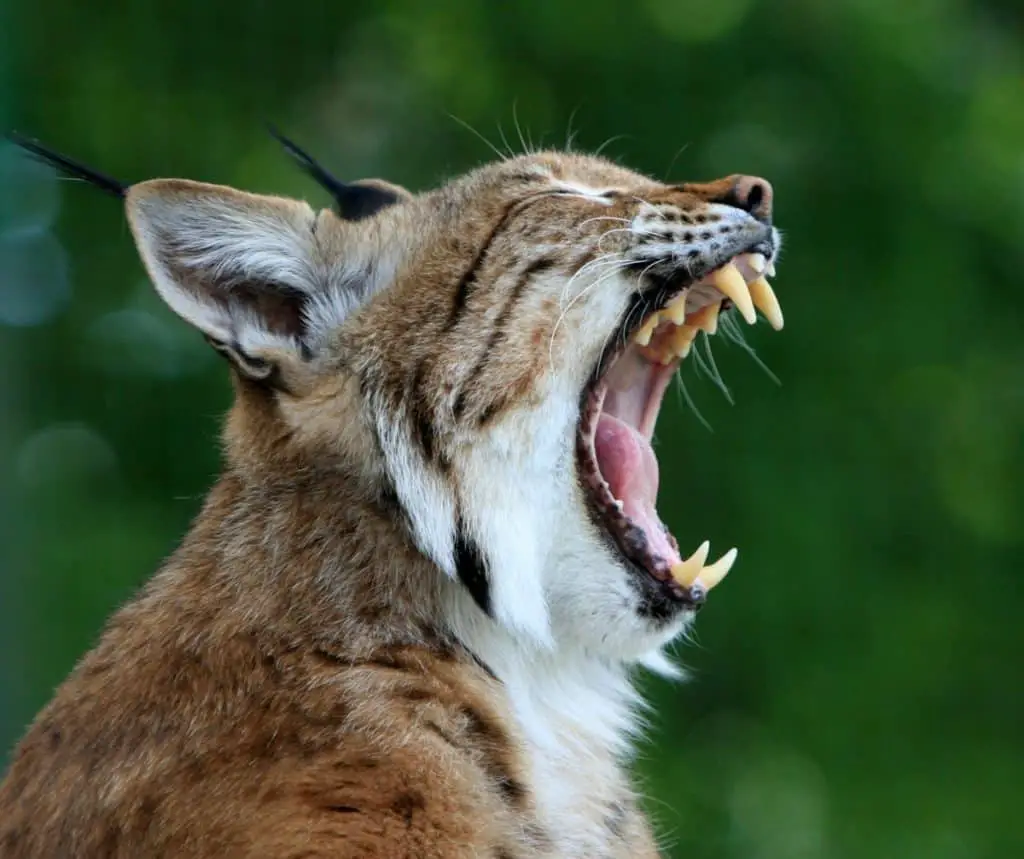
The shocking power of fence chargers is measured in Joules. That’s the measurement of how hard it shocks. I would advise getting nothing less than a 1-Joule fence charger and would highly recommend a 2-Joule model. Here is a Patriot P10 (my Amazon affiliate link) model that puts out 1-Joule. I have this one, and I have a Patriot P20 (my Amazon affiliate link)model that puts out 2-Joules.
The 2-Joule Patriot P20 is the one I use on the perimeter of my property. It’s HOT… and it hurts. But, that’s what I want. I’ve never lost a lamb to a predator when the P20 was up and running. Both of these Patriot models will work with 12-volt or 120-volt. That gives you several application options.
I also recommend this Fence Tester (my Amazon affliate link). It will let you know how “hot” your wire is. It will also help in finding where a fault might be. It makes it much easier to trace out a break in the electric fence, or some other problem. I have found it extremely valuable and really a time saver when diagnosing a problem with a fence.
There are lots of different fence chargers for different applications. If you are in a remote area, or if you’re off-grid, a solar fence charger should be considered. I have this solar model by Parmak (my Amazon affiliate link). It’s a 1.4-Joule fence charger. A solar panel charges the built-in battery, which powers the fence charger. Here’s a Parmak (my Amazon affiliate link) that’s over 3.1-Joules (THAT is HOT).
All you will need to supply is a ground rod. And, if you have steel T-posts for your fence, you can use them for a ground rod. I have done that on a number of electrified fences, and it works great. The T-posts act as the ground rod for the fence charger.
If you have access to an electrical outlet, you can choose a less-expensive 120-volt / 12-volt fence charger like the Patriot. I’ve had many fence chargers over the years, and currently, have about a half a dozen, but the ones I like the best are made by Patriot and Parmak. I found the cheaper fence chargers at Tractor Supply don’t supply enough of a shock to be effective.
To keep small predators out of my chicken house at night, I have a hot wire all the way around the perimeter. Since most of the night time predators for chickens will be very small and low to the ground like possums and skunks, I have this wire about 3 inches off the ground, and have it on a cheap timer that turns it on at dusk and off at dawn (so the chickens won’t get shocked).
I know for a fact I have foxes and raccoons and possums on my property, but since I have installed this simple hot wire around the perimeter of my chicken house, I have not lost anything to a ground predator.
Preventing An Air Attack
Preventing an aerial attack is much more difficult. I have lost several young chickens to the hawk population. Hawks, owls, and eagles are probably the three main aerial predators to consider.
I don’t own a livestock guard dog, but from what I understand they can also be very effective at scaring off predatory birds, so you may want to try that.
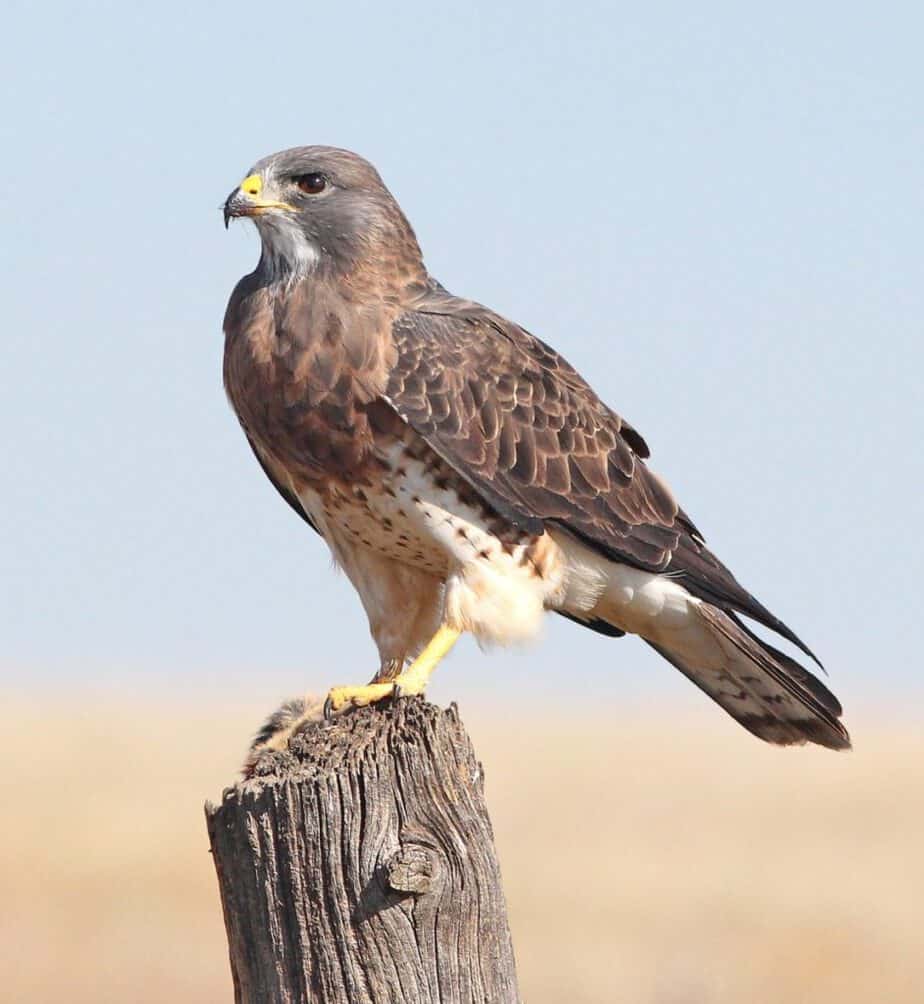
Reflective tape (my Amazon affiliate link) can discourage predatory birds from coming around, but you might want to try some old CDs or DVDs that are no good anymore (surely you have some old AOL CDs). Tie them from a tree branch or somewhere close to where your chickens spend their day.
I’ve used reflective items for keeping birds off my blackberries and grapes, and many say they work well for hawks and other such birds.
Some homesteaders use fake snakes (my Amazon affiliate link) and put them over the top of the chicken house. Snakes can be a deterrent to birds, and some of these look mighty real.
If you have a small chicken run, then it should be easy to just put bird netting over the top of it. I’ve used this type of bird netting (my Amazon affiliate link) and found it to be effective against hawks if you don’t leave any gaps.
If you have an owl problem, you will need to lock your chickens up at night. Since owls are nocturnal hunters, they can grab a chicken right off the roost while they’re sleeping,
The only way to prevent this would be to make sure your chicken house fencing is secure and that it is closed for the night. If you can’t be there each night to close them up, or if you just want to simplify your life, you can get an automatic door (my Amazon affiliate link) for the chicken coop.
I hope this has helped you to identify your potential predators and has given you some effective ways to stop them. in their tracks.

My YouTube Channel has a Predator Playlist that you might find helpful. You can find that Playlist HERE
Here’s a video showing the Electric Fence I implemented: Watch!
On My YouTube Channel, I have around 800 videos dealing with all other aspects of Homesteading, Gardening, Livestock, and Emergency Preparedness. You can find my Channel HERE


